"I've always wondered what it must be like to have a home to go back to." |
Helen |
Debuts are always a terrifying affair, be it a novel, an album or indeed a film. In any medium, you toil for days, weeks, months and sometimes years to bring a project into fruition before you let it loose on the world. Where films are concerned, a debut, unless speaking of particularly prodigious talents, can be shaky, ill-conceived, illogical or sometimes plain bad. It's incredibly rare for a new director to come to the table with something complete, well-formed, and strong enough to stand the rigours of critical scrutiny. Every so often, a film will comes along that do all those things and more. It will appear like magic, which are the film reviewer's equivalent of a break in cloud cover; that blessed moment where the sun peeps through, reaffirming your faith. Sometimes, films like this appear with great fanfare, like Asif Kupidia's The Warrior or Steve McQueen's Hunger. Other films however, creep up, quietly, arriving when we least expect them, like Lynne Ramsey's Ratcatcher or Amma Asante's A Way of Life.
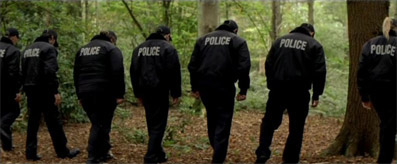
Helen is one such film, a debut feature written, directed and produced by Christine Malloy and Joe Lawlor. However, to speak of them as 'new' to the world of filmmaking is something of a misnomer. Like many of the other directors I mention above, the duo have been working long before they had a feature-length directorial credit to their name. The pair met in the 1980s, and began working on various community arts projects, both in their native Ireland and London, ranging from video and gallery installation to drama, until they turned their focus toward film and created their own production company, Desperate Optimists in 2000. Along the way, they have gathered much critical acclaim and several awards for their short films, including Joy (featured as an extra on this release), and Who Killed Brown Owl, one of seven short films shot between 2004-2006, which are collectively known as the Civic Life series. When considered in that light, Helen is less a debut and more a culmination, representing over two decades of work, which goes some way to explaining why it feels a rather more accomplished film than the label 'debut' implies.
That level of accomplishment is confirmed by the varied and auspicious comparisons some have drawn between it and the work of Michelangelo Antonioni amongst others, citing echoes of Blow-Up in Helen's shooting style, narrative and editing. While it's easy to come to such conclusions – Malloy and Lawlor freely acknowledge such connections – I think it's also somewhat an unfair comparison – not in the sense that Helen isn't worthy of it, though some would argue that's the case – hbut in the sense that we're too quick to label, judge and compare, which is good for the sake of analyses and concise description, but no so good for the film itself, since it can become far too heavy a burden leaving the film open to attack, unable to defend itself and be judged on its own merits. Thankfully, in that regard, there's much to talk about.
Like Civic Life before it, Helen signals a new chapter within their working lives, but carries common thematic and most importantly aesthetic threads from their earlier shorts, giving their evolving output a real sense of progression. While their subjects may have their basis in the tradition of social realist cinema, no two Malloy and Lawlor shorts are the same, even if they are concerned with the same kind of ordinary – I am loathe to say 'working class' – people. Equally, they aren't quite the same kind of films as the director's whose name's spring naturally to mind when you think of the low-key, urban-based dramas which are both the bread and butter and the backbone of the UK film industry. Though they acknowledge their antecedents in Loach and Leigh, Helen especially feels closer to the next generation crop of dramas, typified by Lynne Ramsey's Movern Callar, Duane Hopkins' Better Things, and Samantha Morton's The Unloved, as opposed to the world of gangland and youth depicted in Noel Clark's Kidulthood and Saul Dibb's Bullet Boy.
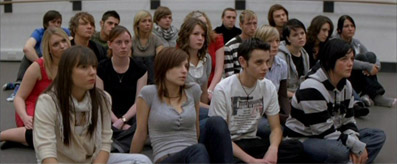
At their heart, Malloy and Lawlor's films are concerned with human stories, in specific social settings. Often, they are lost souls, in pursuit of something or searching to learn more about themselves, and Helen is no exception. Helen (Annie Townsend) is just another eighteen-year-old student, living in the care system, and working part time as a hotel maid to make some money of her own. Things change when her fellow classmate, Joy Thompson, disappears, last seen in the woods near her home. Helen volunteers to take part in a reconstruction by the police as they continue their investigation, lead by Sergeant Williams (Marti Williams) Joy is Helen's polar opposite in every respect, popular with a boyfriend and a loving family, supported and cared for. Over time, Helen gets to know Joy's parents (Sandie Malia and Dennis Jobling) and her boyfriend, Danny (Danny Groenland); glimpsing a life she was never fortunate enough to have. Once an unknown and an outsider, Helen is now the centre of attention.
The immediate question Helen (the film) raises is of course, how Helen (the girl) will be affected by stepping into Joy's shoes, and how this, in turn will alter her own sense of self. Narratives which explore the taking on of identities and impersonation are by no means new, but there's nothing remotely malicious or sinister about her motivations, as in arguably the most famous of all impersonation films, Hitchcock's Vertigo. Instead, Helen constantly wearing a copy of Joy's lurid yellow jacket and styling her hair to look more like her missing counterpart just leaves us with an incredible sense of loss. Just as Joy's parents grieve for the daughter missing from their lives, Helen grieves for the parents missing from hers and the person she could have been, if given the opportunities afforded to Joy. This is just a small example of the many cleverly balanced parallels the film draws between the two young women. Helen is like Alice, peering through the looking glass at the flipside of her own life.
As to whether her seeing this is a gift or a curse, we're never really sure, since Helen is not a film which provides concrete answers. In fact, you're more likely to have a greater number of questions concerning the fates of the two girls than when the film began. But, ultimately, it doesn't matter that we come away from the film not knowing everything, since real life never has such neat resolutions. So often, cases like Joy's go unsolved, with the answers as to why they left or where they are, proving as elusive as the whereabouts of the missing person. This ambiguity inevitably cues us to consider the consequences of fate, and the potentially limitless number of directions our life can take. While walking the route of Joy's last movements, Helen ponders various questions, wondering what Joy is like, eventually concluding that they could have been friends, since they have a lot in common. It's a painfully ironic moment.
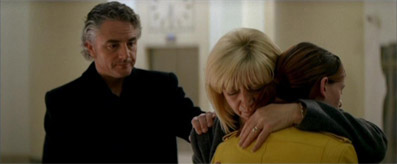
Helen doesn't turn investigator in the classical whodunit sense, but she does investigate who Joy was by learning more about her through those she left behind. In a particularly poignant sequence, Helen witnesses Joy’s father break down at the dinner table, after being invited over. Moments like this offer up some of the film's most affecting scenes, as tiny bursts of emotion break through its flat millpond of a surface. As Helen learns more and more about Joy, her questions grow more intimate, people's reactions to them are more powerful, and it becomes less easy to identify where Helen ends and Joy begins and vice versa. For me, they counter the arguments that Helen is a cold and austere film. While I can agree to an extent that the nature of its calm, quiet aesthetic – full of long takes and fluid tracking shots which make the whole thing seem like a strange dream – means it's a film that's hard to immediately connect with. But, by the same token, if you stay with this film until the roll of the credits, you will be rewarded. Helen is the kind of film which not only endures repeat viewings, but is enhanced by them.
This film is by no means your average popcorn fare, and isn't constructed to be either. While it may look clean, modern and bright, It's candy-coloured hues popping off the screen and lure in the eyes – right from the spectrum of verdant and autumnal hues in the woodlands from which Joy disappears, to her yellow jacket and Helen's red maid's uniform – akin to those vividly coloured Technicolor-era films where everyone and everything was brightly coloured, simply because they could be, the gaudiness here plays as a neat counterpoint to the dreariness of Helen's life.
In terms of pacing, however, Helen is the antithesis of modern mainstream cinema, of the fast-cut, bang-for-your-buck multiplex long distance runner. This is certainly a film for people who like to think, in fact, it invites you to do so. Of course, it also prompts us to consider the seemingly innocuous moments in our own lives; how many times we've passed people in the street or the park, and thought nothing of what became of them, until, like Joy, something does. As a result, Helen is a film which is very much concerned with details, textures and sounds, forcing us to piece things together. Like a thousand piece jigsaw, played out on screen, beginning with some of the pieces already lost. Nothing of what we learn is direct, even less of it through dialogue; the little of what we learn about Joy is filtered through other people. Likewise, Helen comes to learn of the received version of herself, when she's allowed to read the contents of her case file for the first time.
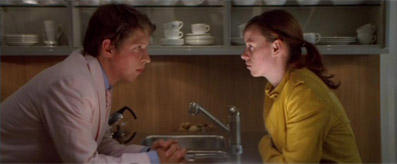
Such an approach is fitting, given that the narrative is built around reconstruction of Joy's disappearance, or rather, the fabrication of it. If you wanted to extend the analogy it makes reference to the process of filmmaking itself, again, pairing up another set of opposing parallels: the real and the artificial, which the film entire marries in its aesthetic. At first, admirable and ambitious, glossy, high production values seem at odds with the naturalistic, understated acting style of Townsend and her fellow cast members, but ultimately it's a gamble that pays off, simply because it's more likely to draw in people who wouldn't ordinarily see a film like this. After all, part of the success of Mike Leigh's Happy-Go-Lucky is due in no small part to his shift toward a primary colouring box aesthetic, whilst continuing to represent his characters and narrative in his famed style. Both Helen and Happy-Go-Lucky break down the stereotype of the social realist or slice of life film as being bleak and dreary. In that respect alone, they make very interesting companions.
If you learn nothing else from this absorbing, intriguing and in all honesty, rare example of contemporary arthouse cinema, than the fact there is more on offer within the UK film industry than laddish crime films, romantic comedies and lavish period dramas, then Helen has done its job. But, there's much more to take from it than that. Quite simply, it allows us to truly understand what it feels like to walk in someone else's shoes in more ways than one. Modernity is defined by the lack of connection between one soul and another, something which can be transcended by our experience of a film such as this one; philosophical perhaps, but not entirely unfounded. Perhaps that is Helen's true message: to learn or re-learn how to connect with people around us, before the choice is removed, regardless of whether a person's disappearance from our lives is literal or figurative. If Malloy and Lawlor's film is indicative of the direction of the industry, then the future of it looks bright, very bright indeed.
A pleasing 2.40:1 anamorphic transfer whose sharpness is a few notches shy of reference quality but that in all other respects deleivers, having a well defined and largely naturalistic colour palette and contrast that delivers strong black levels and highlights without losing detail in darker areas. The transfer, as we tend to expect of modern films, is virtually spotless.
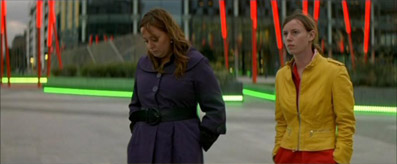
The choice between Dolby 2.0 stereo and Dolby 5.1 surround is a matter of personal preference, as there's very little happening at the rear in the 5.1 track. As is often the way with front weighted soundtracks, the stereo is slightly louder and more widely spread, with the 5.1 has more subtlety. This is not a loud film, however, and both tracks serve it well enough.
This New Wave Films release is nicely presented, carrying three extras, which definitely round out the experience of watching and understanding Helen, in a way which proves that the value of extra features can extend far beyond the superfluous connotations supplemental material carries.
Trailer [1:00]
This is an intriguing and subtle introduction to the film and very much in keeping with the style of the feature; acting as a condensed shorthand for the Malloy and Lawlor aesthetic. Some well-placed quotes from Phillip French and Jonathan Romney certainly pique the interest on first viewing.
Interview with Filmmakers [26:45]
Conducted by critic Jonathan Romney, this is an edited series of talking heads, rather than a classic Q and A panel discussion. As the title suggests, Malloy and Lawlor discuss various aspects of their arts background and career. The interview explores the production process of Helen in detail ranging from casting to aesthetic choices and influences, whilst also paying attention to the origins of their production company, Desperate Optimists and the Civic Life series. Where relevant, a few clips are added to supplement or illustrate their thoughts.
The featurette gives a great insight into the filmmaking pair, their working methods and motivations, which is a real bonus with a film like Helen. Whether you're new to their work or more knowledgeable, there's much to see and learn here. It's a particularly interesting exercise to watch this feature sandwiched between two viewings of the film, since it inevitably prompts you to revisit and, perhaps re-evaluate it in light of their comments.
Joy [9:35]
Shot at the same time as Helen, this short is both its companion and inspiration, reconstructing the disappearance of a young woman, Joy, around which the narrative of Helen is constructed. The focus here though, is Joy herself, somewhat fleshing out her figure, or rather the idea of it, collected from the mediated description given by the policewoman narrator. It plays like a stylised version of Crimewatch; combining its foreboding yet informative tone with Dennis McNulty's electronica score, and the long takes and contemplative tracking shots which define Helen's look and feel.
Malloy and Lawlor capture everything, from the moment the actors settle into their positions and the friendly, respectable, authoritative policewoman addresses us; to Joy's figure, moving farther and farther away, until she disappears completely, fading into the black of the credit sequence. Essentially, this is a longer, fuller version of Helen's first shot, making it something like a rather well-formed doodle that becomes part of a much more complex sketch or the tentative yet bold first line of what will ultimately become a lengthy, accomplished novel.
Helen joins an already impressive and varied catalogue of quality New Wave Films releases, including the Dardiennes' The Silence of Lorna and Nuri Bilge Ceylan 's Three Monkeys. Such lofty company certainly lends Helen a similar air of excellence, and an all-important stamp of approval, which is often hard to come by for a debut feature. However, one as good as this certainly merits the treatment bestowed upon it by New Wave.
Helen will not be a film for everyone. The very nature of Malloy and Lawlor's signature style make it a divisive one. What one person will find haunting and beautiful, another will find tedious and pretentious, there is no middle ground. What is indisputable however, is what a unique, affecting and truly refreshing film Helen is. Christine Malloy and Joe Lawlor offer their audience a taste of a different kind of cinematic experience, in the most cinematic way possible. Helen is an impressive debut and comes highly recommended.
|